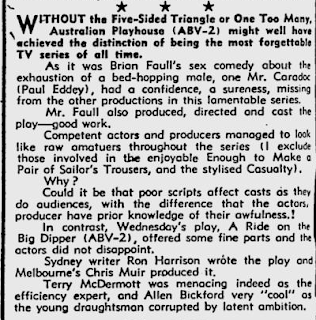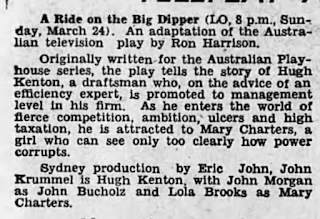Australian play for Wednesday Theatre by Ron Harrison
Plot
John Bucholz owns a construction company in Sydney and has recently taken over a firm in Toowomba. He hires an efficiency expert, Clive Denning, to find someone to run the new business. Denning makes all employees do an efficiency test; the best performing person is a draughtsman, Hugh Kenton, whose rating is an all-time high.
Kenton is sent to Toowomba to run the business, upsetting the former owner, Arthur Winton, but impressing the secretary, Mary Charters. Kenton and Charters begin a romance which leads to a marriage proposal. Kenton says he wants to go back to being a draughtsman and Charters is delighted.
Denning visits Kenton and proposes he takes part in a corporate takeover of the business. Denning makes Bucholz take the efficiency test and the latter performs poorly; this results in Bucholz being replaced by Kenton. Kenton then engineers it so he has power over Denning.
Kenton invites Mary Charters to Sydney and announces his intention to continue in business. Mary dislikes this so Kenton offers to go back to being a draughtsman because "the woman should sacrifice not the man". She breaks it off with Kenton and leaves him.
- Allen Bickford as Hugh Kenton
- Fay Kelton as Mary Charters
- Peter Aanensen as John Bucholz
- Terry McDermott as Clive Denning
- Michael Howley as Arthur Winton
- John Godfrey as Bob Mayes
- Lloyd Cunnington as draughtsman
- Lorenzo Nolan, John Roddick as workmen
- Don Skelton, Nevil Thurgood as foremen
- Carole Ann Aylet
Production
It was written by Newcastle journalist Ron Harrison. He had previously written In the Absence of Mr Sugden for TV.
Once known as The Horst Warch Test.
Harrison wrote about the play in an introduction to a the radio version of the script in the collection, Take one : a selection of award-winning Australian radio and television scripts. This was published in 1972.
He said the main points he wanted to make in the play were:
"Be careful who you pick for promotion; he might end up with your job.
The qualities which make a successful businessman are not those which make a satisfactory husband. Not for Mary, anyway.
Psychological job-testing may be a load of old rubbish but it might just once in a while pick the right man."
He said the genesis of the plot was not big business but a situation he encountered in local council. A council politican wanted to move into wider spheres and so appointed a man to continue his agenda at local council. Harrison wrote "I asked myself: supposing the young man he left behind has only been waiting his chance to go off on his own tangent? He could wreck the whole basis of the first leader's operations." He decided to shift it to big business to avoid a potential libel action; he came up with the idea of making it a draughtsman who did an efficiency exam and then says "the characters, by page 8 or so (as they usually do no matter how tightly you have plotted) took over and went their own way."
Harrison later wrote that the hardest scene to write was the last one. He also said it caused more discussions with directors and editors. "My intention was that Mary should be not shown as a virago but as a deeply hurt girl. This meant that the scene had to be written almost on tiptoe as it were." He said Fay Kelton wanted the sympathy in the scene to be with her character while Chris Muir wanted it to to go Hugh. Harrison said "Mary won - rightly, in my view."
Harrison later wrote a play The Long Memoried Man which was commended in the 1968 Mary Gilmore Award (Tilley Landed On Our Shores won it) but does not appear to have been made.
It was shot in Melbourne at the ABC's studios in Ripponlea.
Lighting - Leigh Hardy. Technical production - Robert Forster. Design - Paul Cleveland. Production and direction - Christopher Muir.
Radio version
He later adapted it for radio in 1968. He eliminated several of the minor characters - something he explained in the introduction to a published version of the radio script.
The radio version won an Awgie Award.
Reception
The Age said it "offered some fine parts and the actors did not disappoint" calling McDermott "menacing" and Bickford "very cool".
The Sydney Morning Herald thought the play was "undersold by the publicity people. It deserved more bally hoo" comparing it to The Power Game. "Exaggerations counted, it held a tense interest through to the last scene when the girl sensibly walked out. Let's hope Harrison's typewriter is clicking out more work. He needs practice, but deserves to make sales."
The Bulletin called it " what TV drama should be. [Terry] McDermott gave a well-paced, intelligent performance as an efficiency - Frankenstein who got clobbered by his own mother in the cold, bloodless mayhem of business. Nothing novel or exciting in the plot, but everything so in seeing it in Australian terms; a believable drama of the times, with believable dialogue. As it was Harrison’s second TV play, and his first one-hour drama, I can only echo the ABC’s Phillip Mann, who said, “It was the kind of work we receive all too rarely, and we hope he intends to stay with it.” A sense of drama seems to be the rare old some thing he's got, and here's hoping he is a stayer, because he seems to have the field to himself."
A positive review of an Australian play by Frank Roberts!
According to Harrison, it was called the TV play of the year by TV Times critic FC Kennedt.
 |
| The Bulletin 16 Sept 1967 |
 |
| SMH TV Guide 28 Aug 1967 |
 |
| SMH 30 Aug 1967 p 21 |
 |
| Canberra Times 28 Aug 1967 p 19 |
 |
| SMH 31 Aug 1967 p 8 |
 |
| The Bulletin 16 Sept1967 p 41 |
 |
| The Age TV Guide 14 Sept 1967 TV Guide p 2 |
 |
| Introduction |
 |
| Introduction |
 | |
| Introduction |
 |
| The Age 21 March 1968 |
 |
| Australian Jewish News 2 June 1967 |
A Ride on the Big Dipper (1967) by Ron Harrison
This was an original TV play by journalist Ron Harrison, who’d previously written the Brisbane shot play In the Absence of Mr Sugden (1965). Big Dipper is a corporate drama, which were in vogue on TV in the late 1960s (eg. Britain’s The Power Game and The Troubleshooters, Australia’s Cobwebs in Concrete and Dynasty).
The story concerns a construction firm run by Bucholz (Peter Aanensen), who hires an efficiency expert, Denning (Terry McDermott) to test his employees for management potential; one of them, a young draughtsman called Kenton (Allen Bickford), scores off the charts and is sent to run a business Bucholz has taken over in Toowoomba, thereby making this a rare early Australian TV play to be set in Queensland. Kenton proves a great success – so much so that Denning recruits him to supplant Bucholz back at the city office, to the consternation of Kenton’s new girlfriend (Fay Kelton).
I don’t think Harrison had much of a TV drama career, which is a shame because he was a first-rate writer. The script for A Ride on the Big Dipper is tight and worked out logically, well-handed by director Christopher Muir, with a particularly fun performance from Terry McDermott. Kenton isn’t a villain, or even particularly ruthless – he’s just smart and work focused. You could interpret this story as him selling his soul or maybe he just dares to have ambition and be more than a suburban slob. That’s the mark of good writing: being able to interpret something a number of different ways.
A radio version of the script was performed and published in a collection of Australian scripts, but I’ve been unable to find too many drama credits from Harrison after this. It’s a loss to our industry – his was a talent worth nurturing.

No comments:
Post a Comment